模块1 Unit 3 Looking good, feeling good语法课件 反意疑问句
文档属性
| 名称 | 模块1 Unit 3 Looking good, feeling good语法课件 反意疑问句 |
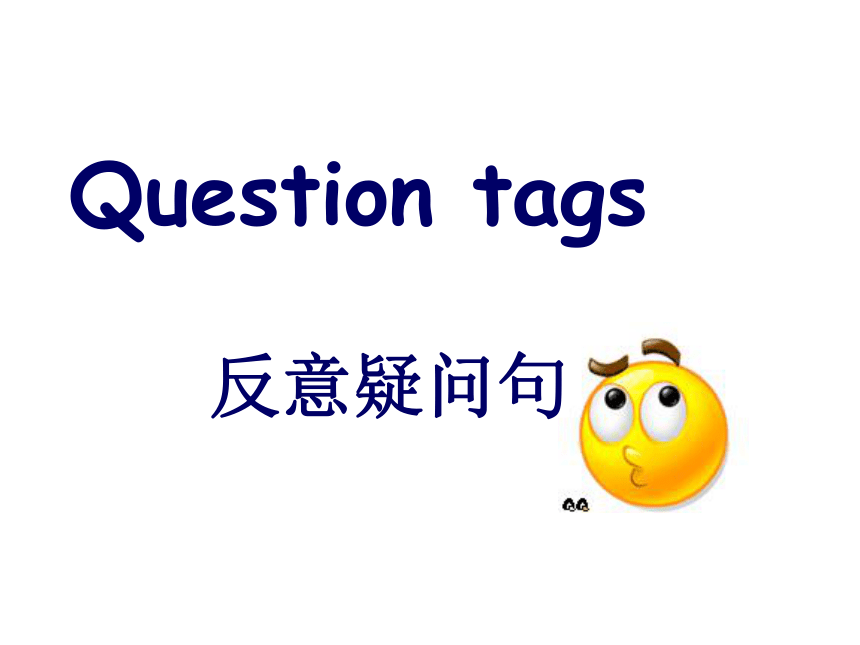
|
|
| 格式 | zip | ||
| 文件大小 | 129.5KB | ||
| 资源类型 | 教案 | ||
| 版本资源 | 牛津译林版 | ||
| 科目 | 英语 | ||
| 更新时间 | 2012-06-01 00:00:00 | ||
图片预览

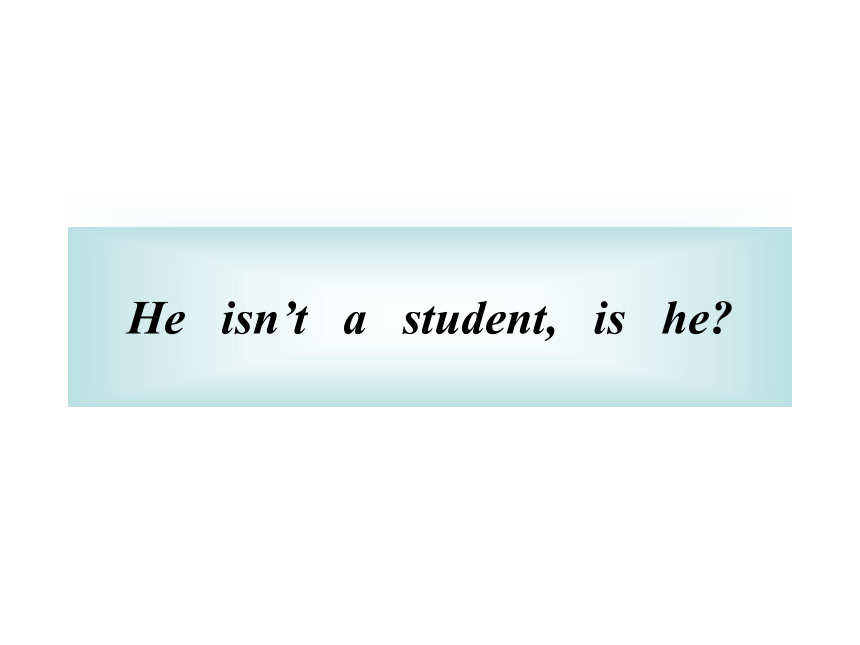
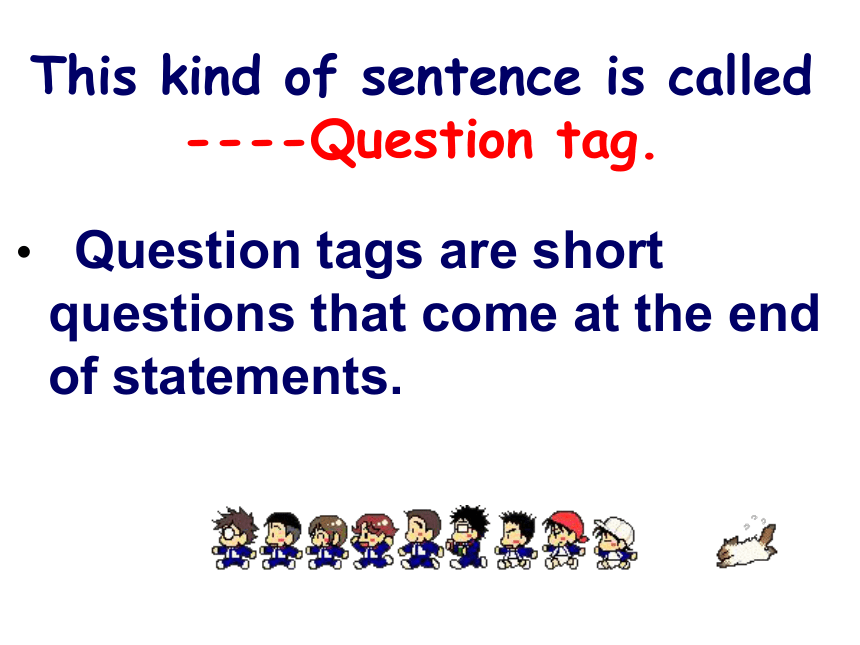
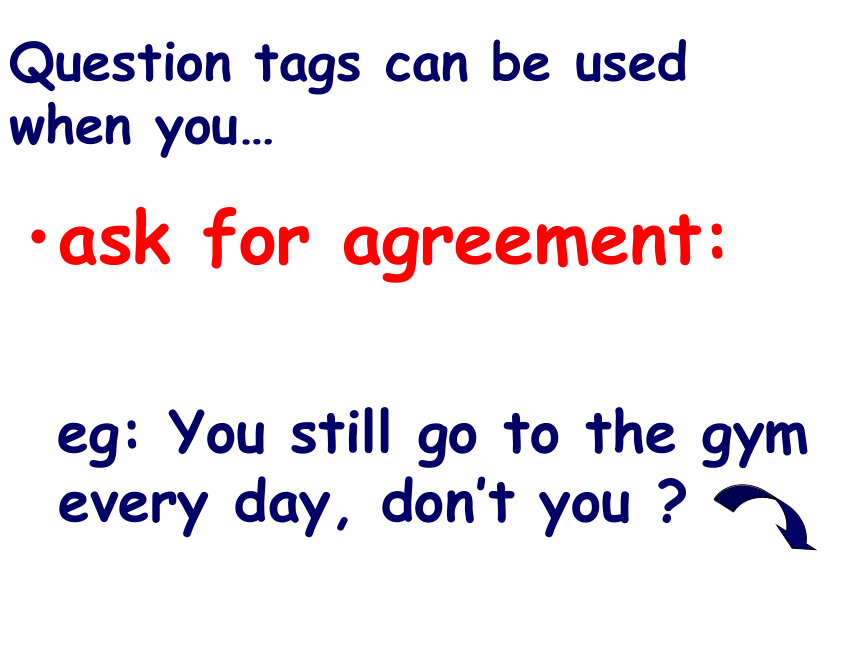
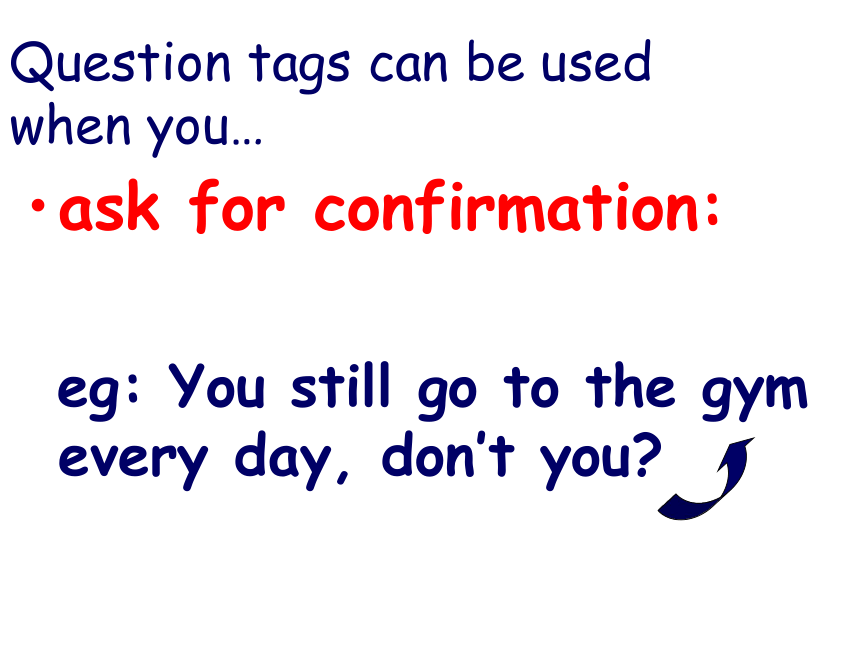
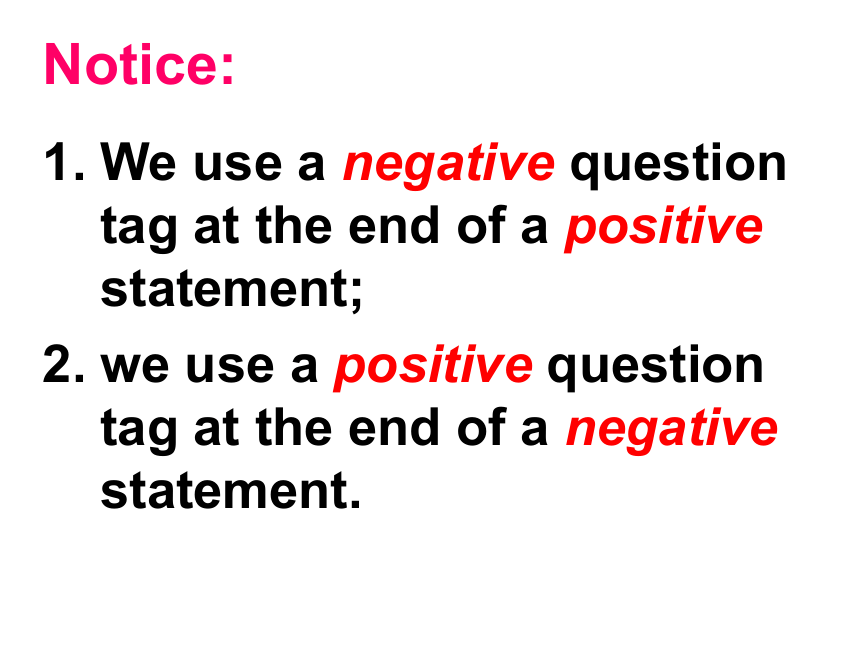
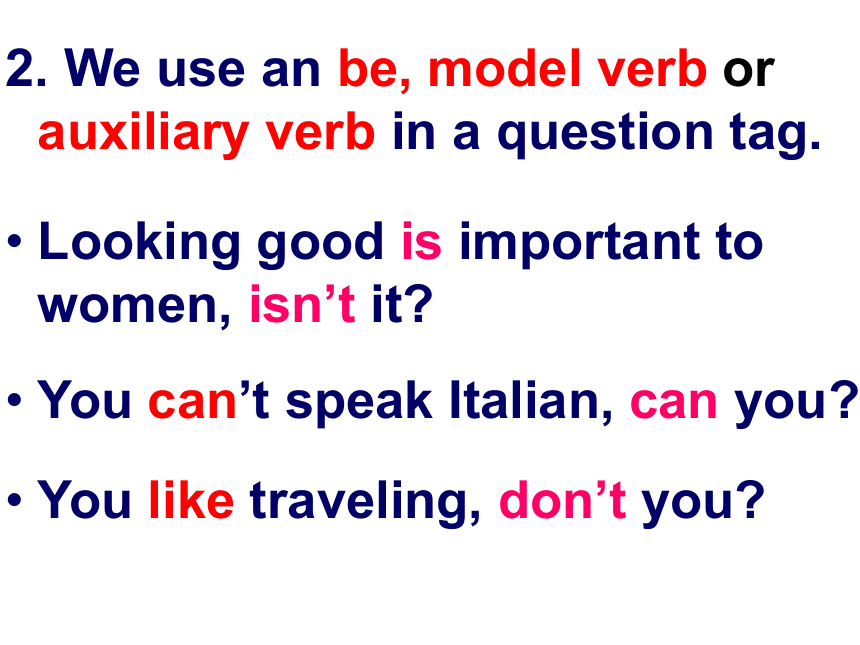
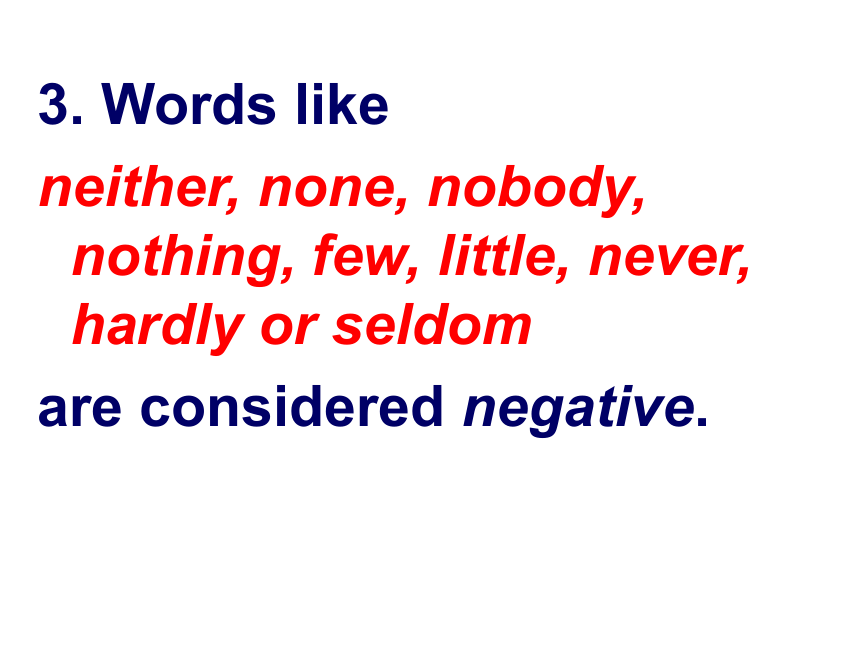
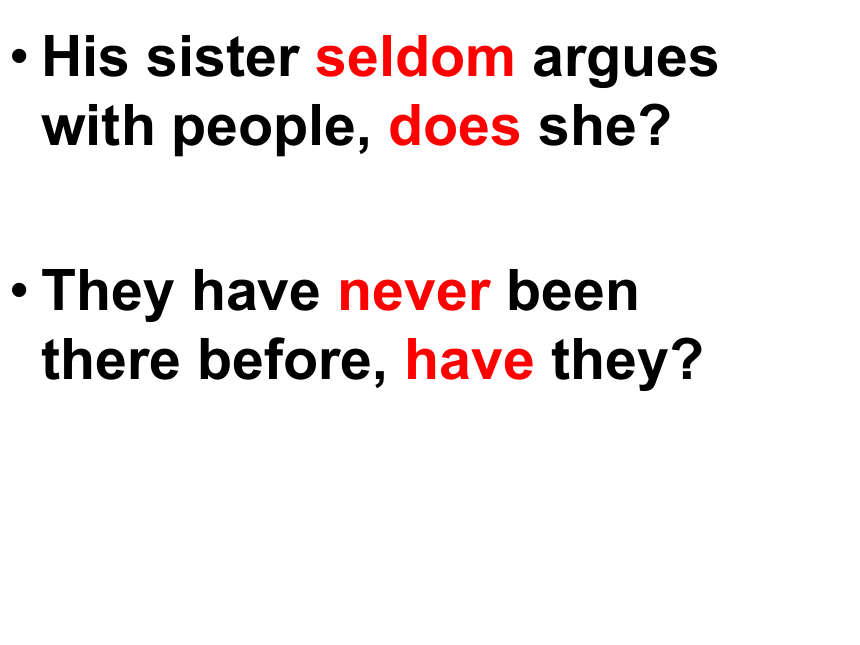
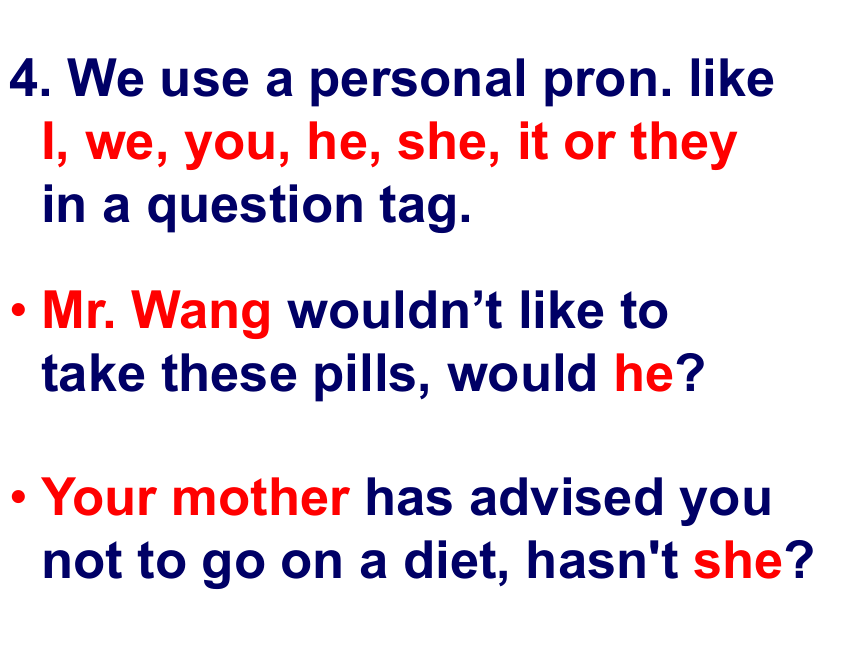
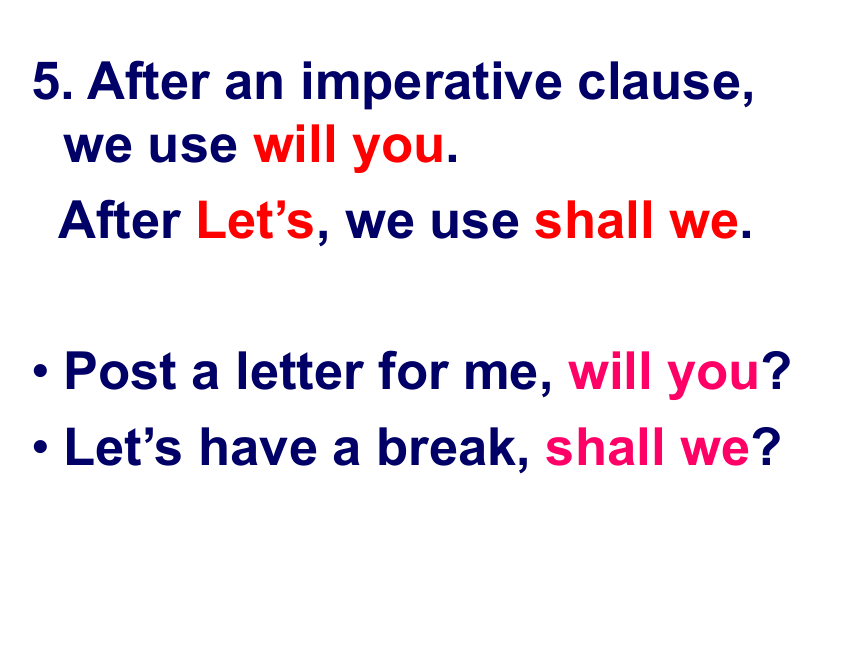
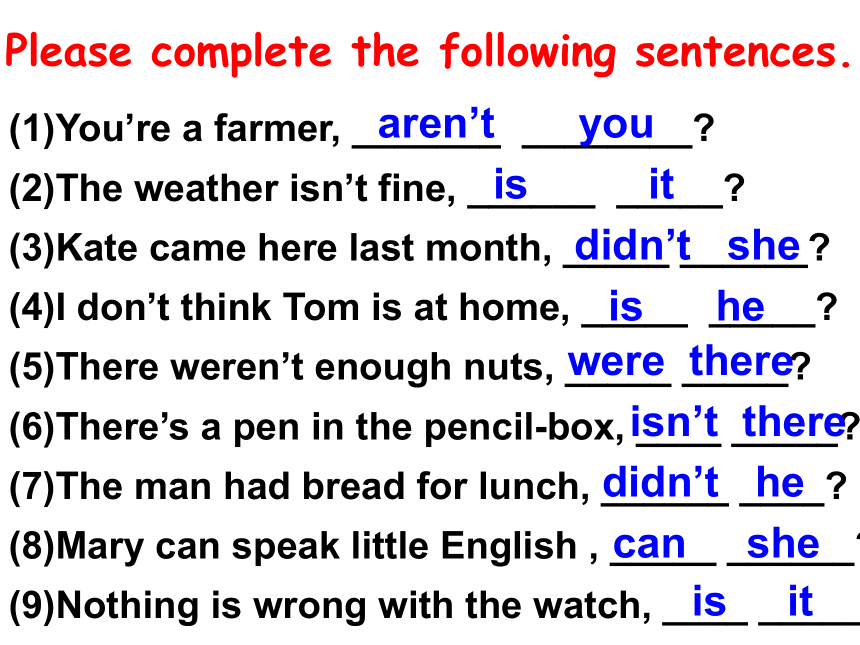
文档简介
(共33张PPT)
Question tags
反意疑问句
He is a boy, isn’t he
He isn’t a student, is he
This kind of sentence is called ----Question tag.
Question tags are short questions that come at the end of statements.
Question tags can be used
when you…
ask for agreement:
eg: You still go to the gym every day, don’t you
Question tags can be used
when you…
ask for confirmation:
eg: You still go to the gym every day, don’t you
Notice:
We use a negative question tag at the end of a positive statement;
we use a positive question tag at the end of a negative statement.
2. We use an be, model verb or auxiliary verb in a question tag.
Looking good is important to women, isn’t it
You can’t speak Italian, can you
You like traveling, don’t you
3. Words like
neither, none, nobody, nothing, few, little, never, hardly or seldom
are considered negative.
His sister seldom argues with people, does she
They have never been there before, have they
4. We use a personal pron. like I, we, you, he, she, it or they in a question tag.
Mr. Wang wouldn’t like to take these pills, would he
Your mother has advised you not to go on a diet, hasn't she
5. After an imperative clause, we use will you.
After Let’s, we use shall we.
Post a letter for me, will you
Let’s have a break, shall we
(1)You’re a farmer, _______ ________
(2)The weather isn’t fine, ______ _____
(3)Kate came here last month, _____ ______
(4)I don’t think Tom is at home, _____ _____
(5)There weren’t enough nuts, _____ _____
(6)There’s a pen in the pencil-box, ____ _____
(7)The man had bread for lunch, ______ ____
(8)Mary can speak little English , _____ ______
(9)Nothing is wrong with the watch, ____ _____
aren’t you
is it
didn’t she
is he
were there
isn’t there
didn’t he
can she
is it
Please complete the following sentences.
(1) I'm as tall as your sister,________
(2) I wish to have a word with you, _______
(3) He must be a doctor, __________
(4) He must have finished it yesterday, _______
(5) He used to take pictures there, ___________
(6) Don't do that again,______
(7) Neither you nor I am engineer, _________
(8) Everything is ready, ________
(9) Everyone knows the answer, ________
Please complete the following sentences.
一)简单句式
结构中反意疑问句的运用
当陈述句部分的主语是名词时,
反意疑问句的主语必须用人称代词来代替。
Your brother has gone to the library, hasn’t he
2. 当陈述句的主语是指示代词this, that时, 反意疑问句的主语用it代替;
These are important reading materials, aren’t they
That isn’t a useful book, is it
指示代词是these, those时, 反意疑问句的主语用they代替。如:
3. 当陈述句部分是I am…时, 反意疑问句部分通常要用aren’t I;
I’m late for the meeting, aren’t I
如陈述句部分的主语是I am not时, 反意疑问句部分通常要用am I.如:
I’m not doing well, am I
4. 当陈述句部分是everyone/everybody, someone/somebody, no one/nobody, none等表示人的不定代词时, 反意疑问句部分的主语多用they, 但也可用he;
Nobody came when I was out, did they
当陈述部分的主语是everything, anything, something, nothing等表示物的不定代词时, 反意疑问句部分的主语用it. 如:
Everything has gone wrong today, hasn’t it
5. 当陈述句部分是“there be+主语+其它” 结构时, 反意疑问部分要用“be (not) + there”结构。如:
There are some bananas in the basket, aren’t there
其余一律用will you, 在这里并非表示疑问, 而是进一步叮咛嘱托。如:
Let’s go to see the film together, shall we
6. 祈使句构成反意疑问句时, 除了Let’s开头的祈使句, 疑问部分用shall we之外,
Let us go to see the film together, will you
7. 当陈述句部分是“had better+动原”时, 疑问部分用“had/hadn’t+主语”。如:
You’d better go to school now, hadn’t you
8. 当陈述句部分有hardly, seldom, few, little, no, never, nowhere等否定词或半否定词时, 反意疑问句部分要用肯定形式。
It is impossible for him to make such a mistake, isn’t it
You did nothing wrong, did you
但是, 如果陈述句部分是含有带有否定前缀或后缀的词时, 反意疑问句部分仍用否定结构。
9. 感叹句的反意疑问句一律使用否定式, 并用be的一般现在时形式。如:
What a foolish child (he is), isn’t he
二)主从复合句
结构中反意疑问句的运用
1. 一般情况下, 陈述句部分是主从复合句时, 反意疑问句部分的代词和助动词应与主句中的主语和动词保持一致。如:
This is the second time that he has been to Japan, isn’t it
2. 在宾语从句中, 如果陈述句部分是“I think (believe, suppose, imagine, expect等)+宾语从句”, 反意疑问句部分应与宾语从句的主谓保持一致, 并要注意否定转移。如:
I don’t think you have heard of him before, have you
注意: 当think等这些动词的主语不是第一人称, 或主语是第一人称, 而动词时态不是一般现在时或一般过去时, 这时, 反意疑问句的助动词和人称代词要与主句保持一致。如:
Mary thinks you will come to the party, doesn’t she
3. 并列复合句疑问部分,谓语动词根据邻近从句的谓语而定。
Mr. Smith had been to Beijing for several times; he should have been in China then , shouldn't he
4. 带有定语从句,疑问部分谓语根据主句的谓语而定:
He is not the man who gave us a talk, is he
(1) I'm as tall as your sister,________
(2) I wish to have a word with you, _______
(3) He must be a doctor, __________
(4) It is impossible , ________
(5) He used to take pictures there, ___________
(6) Don't do that again,_________
(7) You'd better read it by yourself, ___________
(8) Everything is ready, ________
(9) Everyone knows the answer, ___________
Please complete the following sentences.
aren’t I
may I
isn’t he
isn’t it
didn’t he
usedn’t he
will you
hadn’t you
isn’t it
don’t they/
doesn’t he
三)反意疑问句的回答.
对反意疑问句的回答, 无论问题的提法如何, 如果事实是肯定的, 就用yes, 事实是否定的, 就要用no。
1.一He likes playing football, doesn’t he
一Yes, he does. /No, he doesn’t.
2.一His sister didn’t attend the meeting, did she
一Yes, she did. /No, she didn’t.
Homework:
学法大视野P50-54
Question tags
反意疑问句
He is a boy, isn’t he
He isn’t a student, is he
This kind of sentence is called ----Question tag.
Question tags are short questions that come at the end of statements.
Question tags can be used
when you…
ask for agreement:
eg: You still go to the gym every day, don’t you
Question tags can be used
when you…
ask for confirmation:
eg: You still go to the gym every day, don’t you
Notice:
We use a negative question tag at the end of a positive statement;
we use a positive question tag at the end of a negative statement.
2. We use an be, model verb or auxiliary verb in a question tag.
Looking good is important to women, isn’t it
You can’t speak Italian, can you
You like traveling, don’t you
3. Words like
neither, none, nobody, nothing, few, little, never, hardly or seldom
are considered negative.
His sister seldom argues with people, does she
They have never been there before, have they
4. We use a personal pron. like I, we, you, he, she, it or they in a question tag.
Mr. Wang wouldn’t like to take these pills, would he
Your mother has advised you not to go on a diet, hasn't she
5. After an imperative clause, we use will you.
After Let’s, we use shall we.
Post a letter for me, will you
Let’s have a break, shall we
(1)You’re a farmer, _______ ________
(2)The weather isn’t fine, ______ _____
(3)Kate came here last month, _____ ______
(4)I don’t think Tom is at home, _____ _____
(5)There weren’t enough nuts, _____ _____
(6)There’s a pen in the pencil-box, ____ _____
(7)The man had bread for lunch, ______ ____
(8)Mary can speak little English , _____ ______
(9)Nothing is wrong with the watch, ____ _____
aren’t you
is it
didn’t she
is he
were there
isn’t there
didn’t he
can she
is it
Please complete the following sentences.
(1) I'm as tall as your sister,________
(2) I wish to have a word with you, _______
(3) He must be a doctor, __________
(4) He must have finished it yesterday, _______
(5) He used to take pictures there, ___________
(6) Don't do that again,______
(7) Neither you nor I am engineer, _________
(8) Everything is ready, ________
(9) Everyone knows the answer, ________
Please complete the following sentences.
一)简单句式
结构中反意疑问句的运用
当陈述句部分的主语是名词时,
反意疑问句的主语必须用人称代词来代替。
Your brother has gone to the library, hasn’t he
2. 当陈述句的主语是指示代词this, that时, 反意疑问句的主语用it代替;
These are important reading materials, aren’t they
That isn’t a useful book, is it
指示代词是these, those时, 反意疑问句的主语用they代替。如:
3. 当陈述句部分是I am…时, 反意疑问句部分通常要用aren’t I;
I’m late for the meeting, aren’t I
如陈述句部分的主语是I am not时, 反意疑问句部分通常要用am I.如:
I’m not doing well, am I
4. 当陈述句部分是everyone/everybody, someone/somebody, no one/nobody, none等表示人的不定代词时, 反意疑问句部分的主语多用they, 但也可用he;
Nobody came when I was out, did they
当陈述部分的主语是everything, anything, something, nothing等表示物的不定代词时, 反意疑问句部分的主语用it. 如:
Everything has gone wrong today, hasn’t it
5. 当陈述句部分是“there be+主语+其它” 结构时, 反意疑问部分要用“be (not) + there”结构。如:
There are some bananas in the basket, aren’t there
其余一律用will you, 在这里并非表示疑问, 而是进一步叮咛嘱托。如:
Let’s go to see the film together, shall we
6. 祈使句构成反意疑问句时, 除了Let’s开头的祈使句, 疑问部分用shall we之外,
Let us go to see the film together, will you
7. 当陈述句部分是“had better+动原”时, 疑问部分用“had/hadn’t+主语”。如:
You’d better go to school now, hadn’t you
8. 当陈述句部分有hardly, seldom, few, little, no, never, nowhere等否定词或半否定词时, 反意疑问句部分要用肯定形式。
It is impossible for him to make such a mistake, isn’t it
You did nothing wrong, did you
但是, 如果陈述句部分是含有带有否定前缀或后缀的词时, 反意疑问句部分仍用否定结构。
9. 感叹句的反意疑问句一律使用否定式, 并用be的一般现在时形式。如:
What a foolish child (he is), isn’t he
二)主从复合句
结构中反意疑问句的运用
1. 一般情况下, 陈述句部分是主从复合句时, 反意疑问句部分的代词和助动词应与主句中的主语和动词保持一致。如:
This is the second time that he has been to Japan, isn’t it
2. 在宾语从句中, 如果陈述句部分是“I think (believe, suppose, imagine, expect等)+宾语从句”, 反意疑问句部分应与宾语从句的主谓保持一致, 并要注意否定转移。如:
I don’t think you have heard of him before, have you
注意: 当think等这些动词的主语不是第一人称, 或主语是第一人称, 而动词时态不是一般现在时或一般过去时, 这时, 反意疑问句的助动词和人称代词要与主句保持一致。如:
Mary thinks you will come to the party, doesn’t she
3. 并列复合句疑问部分,谓语动词根据邻近从句的谓语而定。
Mr. Smith had been to Beijing for several times; he should have been in China then , shouldn't he
4. 带有定语从句,疑问部分谓语根据主句的谓语而定:
He is not the man who gave us a talk, is he
(1) I'm as tall as your sister,________
(2) I wish to have a word with you, _______
(3) He must be a doctor, __________
(4) It is impossible , ________
(5) He used to take pictures there, ___________
(6) Don't do that again,_________
(7) You'd better read it by yourself, ___________
(8) Everything is ready, ________
(9) Everyone knows the answer, ___________
Please complete the following sentences.
aren’t I
may I
isn’t he
isn’t it
didn’t he
usedn’t he
will you
hadn’t you
isn’t it
don’t they/
doesn’t he
三)反意疑问句的回答.
对反意疑问句的回答, 无论问题的提法如何, 如果事实是肯定的, 就用yes, 事实是否定的, 就要用no。
1.一He likes playing football, doesn’t he
一Yes, he does. /No, he doesn’t.
2.一His sister didn’t attend the meeting, did she
一Yes, she did. /No, she didn’t.
Homework:
学法大视野P50-54
